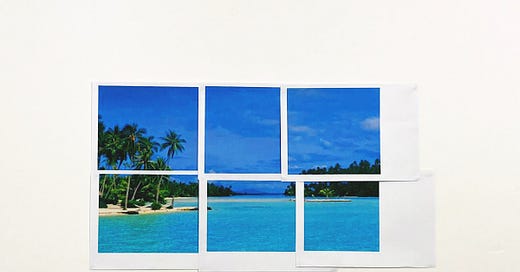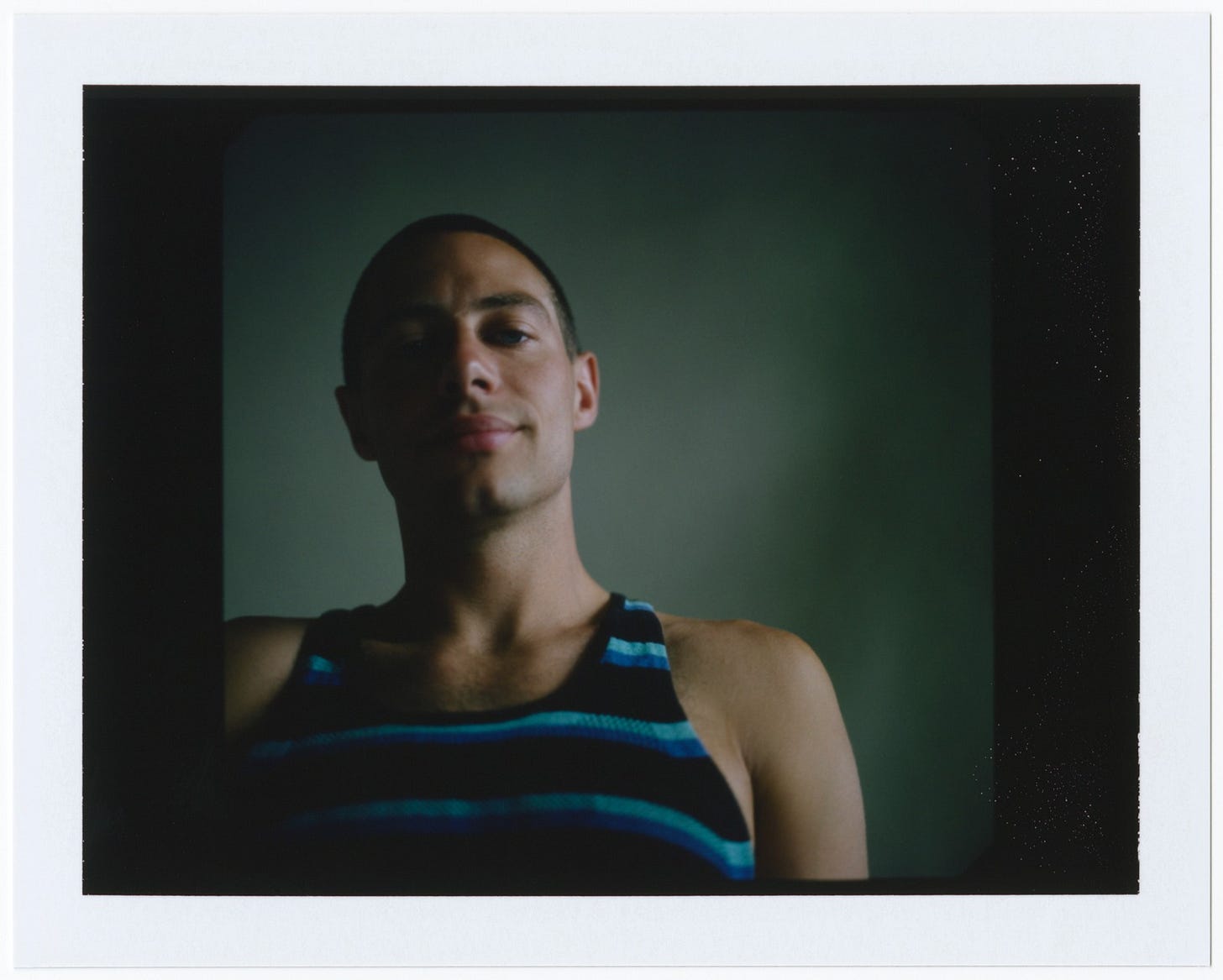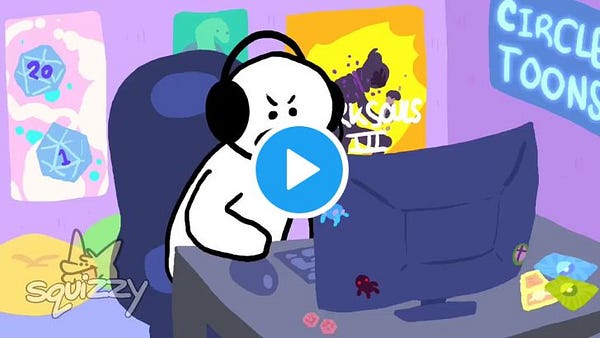What does “coming out” mean?
Anthropologist and writer Barclay Bram on bisexuality and mind-body healing.
Cultural Learnings is an editorial platform for discussions on contemporary culture, curated by Sai Villafuerte. You can support it by subscribing to this newsletter, sharing it with your friends, emailing your thoughts, or answering this survey.
Cultural Learnings is on Manila Community Radio every Wednesday, 17:00 - 18:00 GMT+8. You can access the radio archive here.
A photo Barclay sent me last January: "I was going to take her to Jamaica, but we're all banned from travelling. So, I made jerk chicken for our anniversary, put up a picture of the beach, and danced to reggae in my bedroom."
When I was sixteen, I made out with a girl for the first time.
I was at a house party. We were in the bathroom. I was drunk, it was sloppy. I did it because that was what teenage girls in movies do. I remember leaving the bathroom, thinking: “I’m straight.”
As I aged, this view was challenged by the people around me. I’m often the “token straight girl” in social situations. I’m constantly surrounded by queer friends and family. I’ve watched these same people fall in love, making me realise how utterly relatable falling in love is. The beauty of some women has driven me crazy, like Julia Fox and Mistress Iris. When I explained to my friend Trisha O’Bannon what my “type” of woman was, she called it “femme fatale.”
I feel comfortable calling myself bi-curious. I wouldn’t shut myself off from the possibility of being with a woman. Yet, that first encounter years ago was the most intimate I’ve been with a woman to date. I see glimpses of queerness, and its possibilities, within me, but it feels wrong to fully identify as queer. During my interview with Barclay Bram, whose words weave below this newsletter, he referred to the “gentrification of queerness” – a term he borrowed from the book Detransition, Baby by Torrey Peters. Many people, Barclay said, claim queerness who aren’t necessarily queer and escape when they reach a tricky situation. This can understate the difficult reality of shame and rejection many people in the queer community undergo. So, calling myself queer doesn’t feel quite right. Yet, calling myself straight, or believing heteronormativity is my preference, when I’m as malleable as beliefs can be, doesn’t feel right either.
If there’s anything I learned this month, it’s that there’s nothing wrong with admitting to one’s sexual fluidity, and to feel seen by your peers is so important. Perhaps self-discovery can be defined as a receptiveness to new experiences – the space where dogmas die and give birth to new possibilities. To be honest, I don’t know if I can call myself queer. But I’d like to think I’m doing my best to give queer people the space to be who they want to be.
It’s a pleasure to have Barclay close out this final edition of Pride Month in Cultural Learnings. He’s an anthropologist and writer, finishing his doctorate at the University of Oxford. He’s easily one of the most intelligent people I know, so I hope you enjoy this interview as much as I did.
Tomorrow (Wednesday), I’ll be mixing his selections of soul, jazz, and R&B for lovers – songs he thinks about when he thinks about love. If you’re in the UK, tune in on www.manilacommunityradio.live between 10:00-11:00 BST.
How are you, Barclay? What have you been up to?
I’m working very long hours in the restaurant because London has a massive shortage of chefs at the moment. 1.3 million people have left the UK since the pandemic, including you. [Laughs] 800,000 people have left London. Many of those people were Europeans who worked in hospitality. So, London’s hospitality industry is dying. Diners don't perceive that because it's dying on the backs of overworked chefs. I'm doing that while finishing my thesis. So, how am I? Exhausted.
What does cooking mean to you during a time you should be equally busy writing your thesis?
To me, cooking always meant balance. It’s the flip to my academic work and writing because I cook with my hands. That’s incredibly important – to do something with your body alongside your mind. Switching between Word documents all day would kill me. Right now, because of the situation with restaurants, everything is out of whack. When it's balanced, it's a beautiful synergy between the two worlds. They're very different, but they complement each other because they're different.
How would you describe your style of cooking, compared to what you do as an anthropologist or a writer?
With cooking, I’m still very much finding my voice. I lived in China, went to culinary school in Sichuan, and worked in an Israeli restaurant in London. I’m Swiss-Polish and grew up in a multicultural city. These are all part of me, so it’s hard to put anything I do in a bracket. I want to express all these divergent influences in my cooking, but also be sensitive to issues of cultural appropriation and ownership.
What I do as an anthropologist and a writer are very similar. I like anthropology because it provides me this extended time to blend with a community. The whole point of anthropology is participant observation: going there and seeking questions that are relevant to a group of people – not just going, asking, and leaving. It’s about holding yourself accountable to the people who you do research with, not research on. I never want to “other” anyone in my writing; I want them to feel themselves in it because writing in anthropology can be very extractive. For example, I’m still close to the London taxi drivers I wrote my piece on Granta with, and that’s beautiful. I love writing that expands and shows amazing ways people make meaning in the world.
So, what’s your thesis about?
It’s about mental health in China, specifically the rise of talk therapy. Partly, it’s about what it means to turn inwards – to seek healing within yourself and how that’s a conditioned process. One doesn’t just turn inwards. There are many tools and techniques to develop our interiority, and I’m looking at how it is localised in these Chinese contexts with the interplay of contemporary and indigenous forms of healing.
It’s also about the connection between the internal and external. How do we understand issues of responsibility and blame when it comes to how we feel about the world, particularly in the context of China which is under a totalitarian regime? China also has a brutally competitive market system where positions in the normative good life are scarce. To steal yourself from that competition and develop a resilient self is a powerful and difficult task. How do people do that? One way is to turn inwards. But does turning inwards make the external situation worse or create more tolerance and empathy?
Has writing your thesis affected how you view healing in your day-to-day life?
I lost a lot during the pandemic. I lost my job. I broke up with a man I loved. My grandmother got Covid. I really suffered. Yet, there were so many beautiful moments I focused on and that took years of practice. When I think about it, I’m so immensely grateful to be given four years’ worth of funding to think about healing. This will sit with me for the rest of my life.
Also, healing is a journey. There's no point at which you “arrive” to healing, but there is a point at which you’ve arrived at some sort of contentment. To be content is what you want, I think. Maybe to strive for more is arrogant. I’m also doing this interview from my yoga mat in a park, so clearly it’s affected me!
What do you identify as and what does that mean to you?
I would identify as queer or bisexual. I’ve profoundly loved a man, but I’ve generally dated women. I tried very hard to avoid labels but, one day, I had a debate with a friend and he greatly changed my opinion. “I don’t like labels,” I said. “Why can’t we just accept that?
Then he asked, “Wouldn’t it be nice if we lived in a world that didn’t need labels?”
But we do.
There are plenty of places in the world where if you identified as “X”, you would suffer. Your choice to not identify as X is to step away from that label’s liberating potential when used in a context that’s otherwise intolerant. I’m very lucky to live in a place that’s fluid enough to let me define as anything. In other places, identifying in this way means taking a real stance so others can reach a better position. It’s the same with pronouns. I’m a cis-male, but if it helps anyone who identifies as non-binary or trans, I have absolutely no problem sharing my pronouns. I think it's a beautiful way of showing compassion and care.
But also, you can’t just randomly use a label because it suits you. That label needs to be recognised. That’s why it's important to be accountable to your community.
How did you realise your bisexuality?
I always accepted love comes in many forms and if I met the right person, maybe I could fall for them. I realised my bisexuality because I fell in love, he just happened to be a man. But it wasn’t easy. It required patience from both of us. I reoriented myself, quite literally. I went through the process of coming out, reaffirming who I was and re-negotiating many aspects of myself that was fairly settled.
In what way did this experience colour your understanding of healing?
Coming out is the most confronting experience. I’m very comfortable here [points to head], but I didn’t know how comfortable I was here [points to heart]. So, to have someone confront me with that is powerful.
I also think there’s an issue with how people understand bisexuality. I’m currently dating a woman. I love her and every time I’m with her, I’m with her so fully. What we have is beautiful. Yet, if we end up getting married, there are people who will look at my previous relationship with a man and say that was a phase. If I end up with a man in the future, people will say I was gay all along and I hid it behind all these women. Both these views are so unfair. I don’t experience these relationships as any more or less valid. I love specific people, not concepts. But what becomes of that side of me I worked so hard to step into? I feel a great sadness it won’t be recognised by many people; it’s difficult to reconcile. That’s why queerness and identifying as bi is so important to me.
You can follow Barclay on Instagram, subscribe to his newsletter, or read more of his work on his website.
Barclay’s three Cultural Learnings:
“A fact I really enjoyed recently was the reason why Madeleine biscuits are shaped that way is because they were originally baked in scallop shells. If you can find scallop shells where you are, I implore you to bake a Madeleine in the original way.”
This piece by Nigerian writer Blessing J. Christopher on beauty.
“There’s a big difference between theory and practice. The combination of being in academia and being queer made me realise how boring, dry, and academic queer theory can be. A lot of it shouldn’t be theorised, but lived fully. To me, queerness means not delimiting the experiences of others because it doesn't fit whatever theoretical framework you have of the world. It’s important to allow people to live, and that requires not thinking that much about other people. Let them love who they love. Let them live how they want to live.”
I would like to reiterate this beautiful essay, recommended to me by Barclay a few weeks ago, on queer happiness.
My last two radio shows are available for playback: A re-imagining of a Studio 54 party with Papa Jawnz, and pop songs about coming of age with presh.
#FreeBritney! Watch The New York Times documentary about her abusive conservatorship or read Britney’s full statement on Variety.
Seahorse is an incredibly moving documentary about a gay transgender man’s journey through pregnancy.
Taking My Time to Dance is an incoming short film by Celeste Lapida (she/they). You can help finish post-production by donating here.












